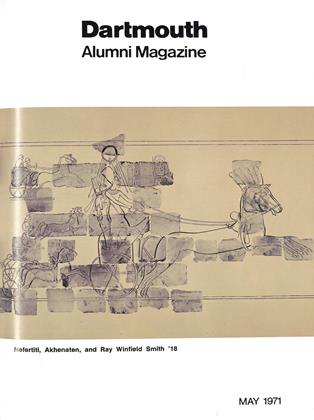By Francis H.Horn '30. With a Foreword by Delyte W.Morris. Southern Illinois University Press:1971. 224 pp. $8.95.
Few men are in a better position to comment on the status of higher education in America than Francis Horn '30, former President of Pratt Institute, then President of the University of Rhode Island, and now President of the Commission on independent Colleges and Universities, State of New York. Few men have had such ripe and varied experience, and few have been so articulate in presenting their views to their professional colleagues and to the general public.
This book is a collection of 16 of the major addresses which Dr. Horn has given over the past two decades. What we have here is not the bold thinking of an educational pioneer pointing to a new or a new-old direction in education. Horn is no Hutchins, Meiklejohn, or Stringfellow Barr. He would not discard our institutions of higher education or the educational philosophies they encompass. His emphasis throughout is to enrich their potential, and within the basic framework that now exists, bring them more nearly up to realizing their civilizing function in this rapidly evolving culture.
He has done his homework. He has read widely in the varied literature about higher education and, by quotation or paraphrase, has given his readers some of the most insightful comments of the leading educators of our generation. Some thoughts of his own deserve study. His proposed five-year college with no major is well argued, as is reappraisal of the role of the fraternity. As a measure of healing the breach between teaching and research, he makes an excellent case for the position of Director of Institutional Research. All are sound, though hardly explosive educational innovations.
Inevitably, there is some—though here surprisingly little—repetition of ideas in a collection of speeches. Just as inevitably, they reflect some fashions of thinking that have quickly dated themselves, such as the possible construction of bomb shelters in this country, and it is now amusing to note his shock in 1964 that tuition in Ivy League colleges had reached $1800 and that the average professor had a salary of over $12,000. Such references, however, remind the reader of the rapidity of change in our generation.
The title of this book is well chosen. For the reader who is looking for an understanding of the challenges and dilemmas that have faced higher education in our time, here is an excellent primer. That it is even now out of date is indicated by the absence of discussion of the idea of the external degree, or of The University Without Walls, or of the growth of the idea of cooperative education, or of the implications of the magnitude of the fiscal crisis facing all institutions of higher education today. American higher education is now entering a period that is fraught with even greater dangers and opportunities than those so ably set forth by Dr. Horn.
Professor Emeritus Jensen was formerlyChairman of the English Department atDartmouth and Dean of the Faculty. He isnow consultant to several colleges andcorporations.
 View Full Issue
View Full Issue
More From This Issue
-
 Feature
FeatureNefertiti, Akhenaten, and Ray Winfield Smith '18
May 1971 By John R. Scotford Jr. '38 -
 Feature
FeatureThe Dartmouth Institute
May 1971 -
 Feature
FeatureTrustees Vote to Consider Associated School for Women
May 1971 -
 Article
ArticleThe Undergraduate Chair
May 1971 By JOEL ZYLBERBERG '72 -
 Article
ArticleFaculty
May 1971 By WILLIAM R. MEYER -
 Article
ArticleHanover's Famous May "Murder"
May 1971
ARTHUR E. JENSEN
Books
-
 Books
BooksHOW TO PLAY THIRD BASE
March 1943 By Fletcher Low'15. -
 Books
BooksNEIGHBORHOOD GROUPS AND URBAN RENEWAL.
JULY 1966 By FRANK SMALLWOOD '51 -
 Books
BooksBOTANY
July 1952 By James P. Poole -
 Books
BooksCRIME AND PUNISHMENT IN EARLY MASSACHUSETTS
NOVEMBER 1966 By JERE DANIELL II '55 -
 Books
BooksPETIT MIROIR DE LA CIVILISATION FRANCAISE
January 1939 By Philip Wheel Wright. -
 Books
Books"The Survival Value of Christianity"
June, 1926 By William Kilborne Stewart




